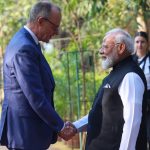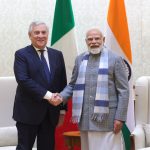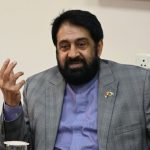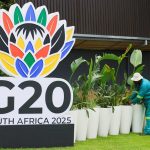 In diplomacy, there are no permanent enemies, but only friends to be made. In a new congruence of strategic and economic interests, the leaders of US and Vietnam met in Washington for landmark talks that seek to open a new chapter in relations between the former foes.
In diplomacy, there are no permanent enemies, but only friends to be made. In a new congruence of strategic and economic interests, the leaders of US and Vietnam met in Washington for landmark talks that seek to open a new chapter in relations between the former foes.
Truth and Reconciliation
The reconciliation has been in the making for quite some time, but the US rebalancing towards Asia, a growing unease in Hanoi over China’s postures in South China Sea and the imperatives of trade are pushing the US and Vietnam in a closer embrace.
Beijing must be watching carefully the hugs and bonhomie as US President Barack Obama welcomed Vietnamese President Vietnam’s President Truong Tan Sang in the White House, and spoke eloquently about the letter from legendary Vietnamese leader Ho Chi Minh to Harry S. Truman. “…we discussed the fact that Ho Chi Minh was actually inspired by the U.S. Declaration of Independence and Constitution, and the words of Thomas Jefferson,” said Obama.
Mr Sang is only the second Vietnamese president to have visited the US since the two countries resumed diplomatic ties in 1995 and nearly four years after the two countries ended a brutal war that inflicted countless casualties on both sides. The memories of the Vietnam war still hover in the air, but pragmatism and new strategic calculations favour a deepening of rapprochement.
Against this backdrop, the talks between the leaders of the US and Vietnam July 25 focused on the Trans-Pacific Partnership that seeks to provide a fresh impetus to bilateral trade and investment. Pushing for stronger US-Vietnam relations, Obama struck a note of reconciliation and realism. “We all recognise the extraordinarily complex history between the US and Vietnam. Step by step we have been able to establish a degree of mutual respect and trust,” said Mr Obama.
The Vietnamese leader was also refreshingly pragmatic as he pushed for an upgrade in the Washington-Hanoi ties. “We touched upon the war legacy issues including human rights which we still have differences on,” said Mr Truong Tan San.
Looking ahead, he stressed that these issues should not prevent closer links between the two countries as he invited Mr Obama to visit Vietnam.
China Factor
T he visit by the Vietnamese president to the US has been widely seen and interpreted as part of Hanoi’s strategy to seek counterbalance against perceived Chinese assertiveness in the South China Sea. China is Vietnam’s largest trading partner, but the relations have been strained recently by renewed assertion of claims on the disputed China Sea by both Hanoi and Beijing. In this context, the TPP could prove to be a useful avenue for Vietnam to diversify its trade relationship to lessen its dependence on Beijing.
he visit by the Vietnamese president to the US has been widely seen and interpreted as part of Hanoi’s strategy to seek counterbalance against perceived Chinese assertiveness in the South China Sea. China is Vietnam’s largest trading partner, but the relations have been strained recently by renewed assertion of claims on the disputed China Sea by both Hanoi and Beijing. In this context, the TPP could prove to be a useful avenue for Vietnam to diversify its trade relationship to lessen its dependence on Beijing.
American analysts have cited the China factor as a key propellant driving the US and Vietnam closer. “When Vietnam feels insecure, who is it going to feel insecure about? Laos? Cambodia? Thailand? The United States is too far away … so China,” University of Virginia political scientist Brantly Womack, a long-time watcher of US-China-Vietnam relations, told Voice of America.
In a bid to protect its strategic autonomy, Vietnam is not just courting the US, but is also trying to persuade rising Asian powers like India to play a more proactive role in the East Asia theatre. The Vietnamese prime minister sprang a surprise last year when he exhorted India to play a more proactive role in defusing the South China Sea crisis.
Against this backdrop, the Vietnamese leader said in Washington: “Amidst a changing regional and world landscape, the major powers, including the United States, have an important role and responsibility in dealing with hotspots in the region such as the East Sea – East China Sea and such global issues as energy security, food security, transnational crime, climate change, and so on. This has become ever more imperative.” “In that spirit, Vietnam welcomes the United States enhanced cooperation with the Asia Pacific for peace, stability, and development in the region,” he added.
No Permanent Enemies, Only Friends
The US has smelt an opportunity in Vietnam’s China anxieties as well as in the ongoing economic resurgence of the Southeast Asian country. It’s not easy to let go of burdens of history, but Washington is ready to walk that extra mile to build a lasting reconciliation with Hanoi. This new spirit of pragmatism and flexibility could be sensed in US U.S. Secretary of State John Kerry’s welcome speech at a working lunch he hosted for the visiting Vietnamese president. “The Vietnamese have learned from their own history that we all have no permanent enemies, only friends yet to be made,” he said.
It’s Economics! Vietnam Success Story
“Today, when Americans hear the word Vietnam, they are able to think of a country, not a war. And that is our shared accomplishment. In the past 18 years, the wisdom of normalization has been amply proven. Vietnam has emerged as one of Asia’s great success stories.”
The Vietnamese leader welcomed the deepening of economic linkages and indicated his readiness to walk the extra mile to address human rights concerns through an honest dialogue.
“I’m also happy to note that economic trade ties continue to stay at the heart of bilateral relations, serving both as the cornerstone of and an engine for the overall relationship.” The United States is now a leading economic trade partner and the largest export market of Vietnam,” he said.
“Our two countries have continued to maintain dialogues on issues of mutual interest, including human rights. Through dialogues, we have achieved better mutual understanding, particularly about each other’s approach and distinct cultural and historical circumstances. Vietnam has been making sustained efforts to protect and promote human rights so that the people can benefit from the finest results of the reform process which is going on.”
Author Profile

- Manish Chand is Founder and Editor-in-Chief of India Writes Network (www.indiawrites.org) and India and World, a pioneering magazine focused on international affairs. He is CEO, Centre for Global India Insights, an India-based think tank focused on global affairs.
Latest entries
 India and the WorldJanuary 13, 2026India, Germany raise the bar for defence, economic ties
India and the WorldJanuary 13, 2026India, Germany raise the bar for defence, economic ties India and the WorldDecember 12, 2025India-Italy bonding: Tajani’s visit raises the bar for business, maritime ties
India and the WorldDecember 12, 2025India-Italy bonding: Tajani’s visit raises the bar for business, maritime ties In ConversationNovember 26, 2025G20 is a Force for global Good
In ConversationNovember 26, 2025G20 is a Force for global Good articlesNovember 26, 2025Rescuing G20 from North-South divide: Ubuntu Moment
articlesNovember 26, 2025Rescuing G20 from North-South divide: Ubuntu Moment







